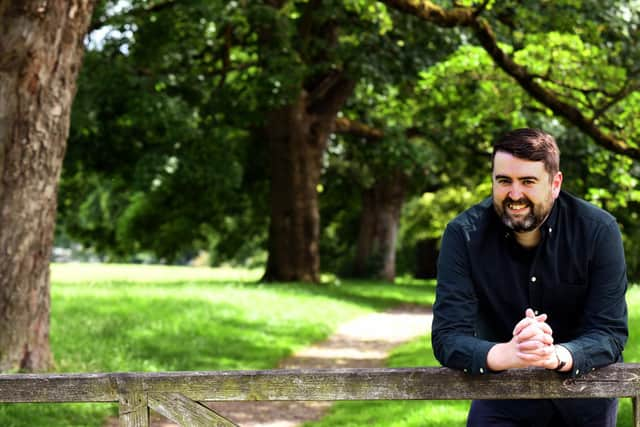Making the most of North's natural assets will benefit everyone, says National Lottery Heritage Fund's David Renwick
It has seen him work in nature-focused jobs across Yorkshire in the last two decades, from wetland restoration in Scarborough to biodiversity in the East Riding and conservation in the North York Moors.
Now in a senior role at the National Lottery Heritage Fund (NLHF), he has been struck by how the coronavirus and the ensuing lockdown has awoken an awareness in the population as a whole of the importance of the natural world on their doorstep.
Advertisement
Hide AdAdvertisement
Hide Ad”If the current COVID-19 pandemic has shown us anything, it is the great importance of the nature on our doorsteps in the North of England, particularly in yielding greater health and wellbeing,” says the 39-year-old, who now lives in Malton, North Yorkshire.
His role as area director for the North for NLHF puts him in charge of the team responsible for spending the good cause money allocated to the region’s heritage from lottery ticket sales, giving him a budget of some £45m.
Recent major projects funded by the organisation include the £13.6m handed to Hull to help it celebrate its maritime history and put its heritage at the heart of the city’s regeneration. But after a consultation with lottery players, the public and other groups, nature and landscape are now more of a focus.
“Obviously with nature being a big concern in terms of its ongoing decline the public is more invested in that than ever and it came through loud and clear that was something they want to really prioritise”, says Mr Renwick.


Advertisement
Hide AdAdvertisement
Hide Ad“So our role is to try and not just fund projects that will help nature, but also bring people together, bring different actors together, try and get those connected in with other agendas, economic and social and try and make sure communities also have the best chance of linking in with nature on the doorsteps as well.
“At the moment with what we’ve got going on in our local nature green spaces and our bigger assets, like national parks, it’s all the more important.”
To this end, £3.4m was spent on the Ryevitalise scheme to encourage people to reconnect to the River Rye in North Yorkshire, supporting the regeneration of the local landscape with a host of different projects.
The aim is to establish the river, described as a “glistening and dynamic landmark connecting the Cleveland Hills overlooking Teesside in the north and the Howardian Hills to the south”, as a unifying community force.
Advertisement
Hide AdAdvertisement
Hide AdAnd a separate project encouraged young people with mental health challenges from Sheffield to engage with nature as a way of boosting their confidence and social skills.
“It was a much smaller award, but it really showed how actually by visiting natural sites in the area there was a demonstrable impact on their mental health”, says Mr Renwick.
The arrival of coronavirus and the devastating impact it has had on the finances of local heritage charities and trusts has meant a short-term change in priorities, with an emergency fund handing out grants of between £3,000 and £250,000 to keep them afloat so they can continue to play a role in society.
But together with leaders from a number of environmental organisations across northern England, like the Woodland Trust, Natural England and Northumberland National Park, Mr Renwick is now thinking bigger. Their venture, Nature North, brings together leading environmental organisations working in the North of England, to “deliver nature recovery at a strategic scale”.
Advertisement
Hide AdAdvertisement
Hide AdWorking with Local Enterprise Partnerships (LEPs), the bodies responsible for economic growth in the North, its members want to amplify the importance of natural heritage and the role it can play in creating a sense of pride in people’s hometowns, cities and counties.
“The first thing to recognise is nature doesn’t respect administrative boundaries,” says Mr Renwick, explaining the scheme.
“It doesn’t work to LEP boundaries, or even the Northern Powerhouse geography. But what it does do very well is span those areas, and scale for nature is really important.
“So if we have a large joined-up and really rich and functional set of habitats that support different wildlife species, then nature can, if it’s given a chance, look after itself. What we increasingly recognise though is that we need to create a framework to allow that to happen.”
Advertisement
Hide AdAdvertisement
Hide AdBuoyed by a report by think-tank IPPR North stressing the importance of nature to the economy, Mr Renwick has high hopes for the months ahead.
“You can’t separate nature from the economy, because it’s all about how we use land, ultimately, and making that space for nature to survive and prosper, and to give us the economic benefits that we know it does provide, whether it be flood risk benefits, whether it be mental health benefits, whether it be the products we actually get from land, food, fibre, water.
“We need to take an approach that looks at that bigger scale, and the North of England has many of those large scale habitats that if we get them into the right management will boost that benefit.”
'Exciting' Northern Forest
The Northern Forest, a plan to plant 50 million trees in and around the cities of Liverpool, Manchester, Leeds, Sheffield and Hull, is a “very exciting project”, says Mr Renwick.
Advertisement
Hide AdAdvertisement
Hide AdBut he says the scheme, to improve levels of woodland coverage in the North, needed “a lot more work to actually develop how it would work” after it was launched in early 2018. NLHF has provided funding to help the Woodland Trust, which is running the scheme, set themselves up properly and improve governance.
Mr Renwick said: “So they’ve got a really good foundation to build on, that project is just about finished and we’re now kind of waiting to see what the next steps are and how we might support them.”